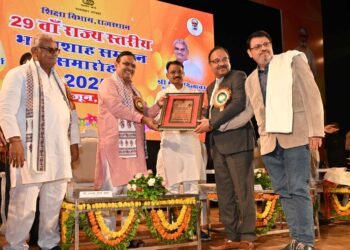MUMBAI (India CSR): In a recent address at the national Chartered Accountant (CA) conference, Finance Minister Nirmala Sitharaman laid out a comprehensive vision for the future of the accounting profession in India. She emphasized the need for CAs to familiarize themselves with emerging global practices such as carbon accounting, corporate social responsibility (CSR) accounting, and ESG (environmental, social and governance) reporting. Sitharaman also pointed out the role of CAs in supporting the digital transformation of various industries, underscoring their role as leaders in adopting new technologies.
Embrace Emerging Accounting Fields
Carbon, CSR, and ESG
During her speech, the Finance Minister stressed that CAs should not only master traditional accounting methods but also become proficient in new-age areas like carbon accounting, CSR accounting, and ESG due diligence. Given the global trend towards sustainability, she believes that Indian CAs must be at par with their international counterparts. Sitharaman urged the community to establish best practices as templates for meeting global requirements, which are increasingly becoming mainstream.
The Role of Technology
Driving India’s New Economy
According to Sitharaman, the new Indian economy is powered by start-ups and industries making a transition from traditional to modern methodologies. She expressed that this shift requires CAs to adopt technology in their practices and encourage their clients to do the same. Highlighting the need for technology adoption, she added that CAs can guide and encourage their clients to embrace new technologies, thereby setting an example themselves.
International Collaboration
Global Leadership & MoUs
The government is actively engaged in enabling Indian CAs to work with their global counterparts. Sitharaman mentioned existing memoranda of understanding (MoUs) and called for their full utilization. She specifically referred to the recent renewal of the MoU with the Institute of Chartered Accountants in England and Wales (ICAEW) and encouraged leveraging similar MoUs with countries like Australia, New Zealand, Ireland, Canada, and various Middle Eastern and African nations.

Financial Literacy and Compliance
Educating Retail Investors and Expanding the Tax Base
The Finance Minister commended the efforts of CAs in expanding the country’s tax base and the smooth implementation of the Goods and Services Tax (GST) regime. She also emphasized the role of the Institute of Chartered Accountants of India (ICAI) in improving financial literacy across the country, given its wide presence through branches, regional councils, and digital platforms. Sitharaman suggested that ICAI is well-positioned to extend its educational initiatives, particularly in terms of financial literacy for retail investors and students.
Finance Minister Nirmala Sitharaman’s address outlines a clear and expansive role for Chartered Accountants in the rapidly evolving economic landscape.
Future Prospects
The Road Ahead for CAs
Building on the minister’s speech, the future for Chartered Accountants in India looks promising but also demands a proactive approach. As the world turns its focus to sustainable business practices, CAs are expected to be on the frontline, ensuring compliance and guiding corporate decision-making. The immediate need is for continuous upskilling in new fields and technologies. By embracing emerging areas of accounting, adopting technology, fostering international collaborations, and contributing to financial literacy, CAs can significantly elevate their professional status and contribute more effectively to national and global economic goals.
Policy Implications
Government’s Role in Facilitating Change
The government, for its part, seems committed to providing a conducive environment for CAs to thrive both domestically and internationally. The Finance Minister’s assurance of active engagement with other countries opens the door for cross-border collaborations that could enrich the Indian accounting profession with global best practices.
Challenges and Responsibilities
A Balancing Act
While opportunities abound, challenges remain. CAs will need to balance their traditional roles with these new expectations, including the ethical considerations that come with areas like ESG reporting. It’s a fine line to walk between adhering to global standards and understanding the intricacies of local business landscapes.
Skill Development and Training
Bridging the Gap
For CAs to meet these lofty expectations, an overhaul of the current educational and training systems may be required. The ICAI could develop specialized courses, workshops, and certifications in new-age accounting fields like carbon accounting, ESG, and CSR. Such initiatives will help bridge the knowledge gap and prepare CAs for the complex tasks that lie ahead. The onus now lies on educational bodies like the ICAI and the CA community at large to heed these directives and evolve in step with the demands of the modern world.
The Role of Technology, Revisited
Ensuring Seamless Transition
Adopting technology isn’t just about making accounting practices more efficient; it’s also about enhancing the analytical capabilities that CAs can offer. From cloud-based accounting solutions to big data analytics, technology can provide invaluable insights for business strategy and compliance. ICAI and other governing bodies should be proactive in training CAs on these new tools to ensure a seamless transition into the digital age.
Community and Stakeholder Engagement
Beyond Numbers
Chartered Accountants have an influential role to play in society, beyond just crunching numbers. As trusted advisors to corporations and small businesses alike, they are in a unique position to influence positive changes in business ethics, corporate governance, and sustainable practices. Community outreach and stakeholder engagement should therefore be a significant part of the CA’s evolving role.
Regulatory Adaptations
Keeping Pace with Change
As the world evolves, so too will the rules governing financial practices. CAs will need to be well-versed in the latest regulations not just in India but globally, especially as Indian businesses expand their international footprints. The ICAI, in collaboration with the government, could consider creating a dynamic, regularly updated platform that provides CAs with information on the latest global and local regulations.
Concluding Remarks
The directions provided by Finance Minister Nirmala Sitharaman offer a roadmap for the future of Chartered Accountants in India. This is a pivotal moment for the profession, marking a shift from traditional practices to a more integrated, globally-aligned approach. It’s a challenging yet exciting time to be a Chartered Accountant, and those who adapt will be at the forefront of India’s evolving economic landscape. The opportunities are vast, but the time to act is now.
(CopyRight@India CSR)




















